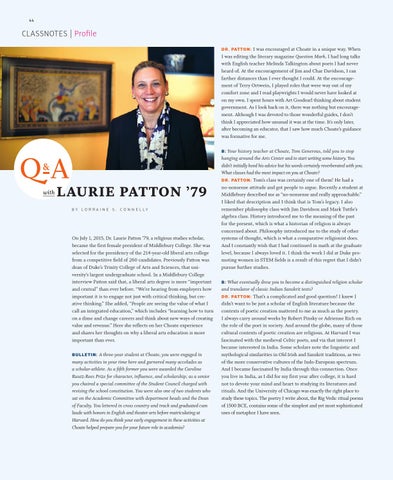44
CLASSNOTES | Profile DR. PATTON: I was encouraged at Choate in a unique way. When
I was editing the literary magazine Question Mark, I had long talks with English teacher Melinda Talkington about poets I had never heard of. At the encouragement of Jim and Char Davidson, I ran farther distances than I ever thought I could. At the encouragement of Terry Ortwein, I played roles that were way out of my comfort zone and I read playwrights I would never have looked at on my own. I spent hours with Art Goodearl thinking about student government. As I look back on it, there was nothing but encouragement. Although I was devoted to those wonderful guides, I don’t think I appreciated how unusual it was at the time. It’s only later, after becoming an educator, that I saw how much Choate’s guidance was formative for me.
& with
LAURIE PATTON ’79 by l o r r a i n e s. c o n n e l ly
On July 1, 2015, Dr. Laurie Patton ’79, a religious studies scholar, became the first female president of Middlebury College. She was selected for the presidency of the 214-year-old liberal arts college from a competitive field of 260 candidates. Previously Patton was dean of Duke’s Trinity College of Arts and Sciences, that university’s largest undergraduate school. In a Middlebury College interview Patton said that, a liberal arts degree is more “important and central” than ever before. “We’re hearing from employers how important it is to engage not just with critical thinking, but creative thinking.” She added, “People are seeing the value of what I call an integrated education,” which includes “learning how to turn on a dime and change careers and think about new ways of creating value and revenue.” Here she reflects on her Choate experience and shares her thoughts on why a liberal arts education is more important than ever. BULLETIN: A three-year student at Choate, you were engaged in
many activities in your time here and garnered many accolades as a scholar-athlete. As a fifth former you were awarded the Caroline Ruutz-Rees Prize for character, influence, and scholarship; as a senior you chaired a special committee of the Student Council charged with revising the school constitution. You were also one of two students who sat on the Academic Committee with department heads and the Dean of Faculty. You lettered in cross country and track and graduated cum laude with honors in English and theater arts before matriculating at Harvard. How do you think your early engagement in these activities at Choate helped prepare you for your future role in academia?
B: Your history teacher at Choate, Tom Generous, told you to stop hanging around the Arts Center and to start writing some history. You didn’t initially heed his advice but his words certainly reverberated with you. What classes had the most impact on you at Choate? DR. PATTON: Tom’s class was certainly one of them! He had a no-nonsense attitude and got people to argue. Recently a student at Middlebury described me as “no-nonsense and really approachable.” I liked that description and I think that is Tom’s legacy. I also remember philosophy class with Jim Davidson and Mark Tuttle’s algebra class. History introduced me to the meaning of the past for the present, which is what a historian of religion is always concerned about. Philosophy introduced me to the study of other systems of thought, which is what a comparative religionist does. And I constantly wish that I had continued in math at the graduate level, because I always loved it. I think the work I did at Duke promoting women in STEM fields is a result of this regret that I didn’t pursue further studies. B: What eventually drew you to become a distinguished religion scholar and translator of classic Indian Sanskrit texts? DR. PATTON: That’s a complicated and good question! I knew I didn’t want to be just a scholar of English literature because the contexts of poetic creation mattered to me as much as the poetry. I always carry around works by Robert Pinsky or Adrienne Rich on the role of the poet in society. And around the globe, many of those cultural contexts of poetic creation are religious. At Harvard I was fascinated with the medieval Celtic poets, and via that interest I became interested in India. Some scholars note the linguistic and mythological similarities in Old Irish and Sanskrit traditions, as two of the more conservative cultures of the Indo-European spectrum. And I became fascinated by India through this connection. Once you live in India, as I did for my first year after college, it is hard not to devote your mind and heart to studying its literatures and rituals. And the University of Chicago was exactly the right place to study these topics. The poetry I write about, the Rig Vedic ritual poems of 1500 BCE, contains some of the simplest and yet most sophisticated uses of metaphor I have seen.
